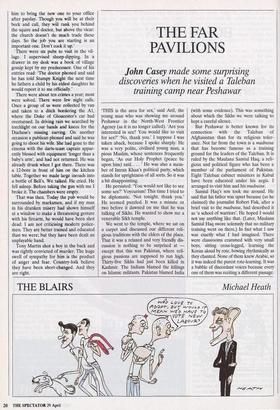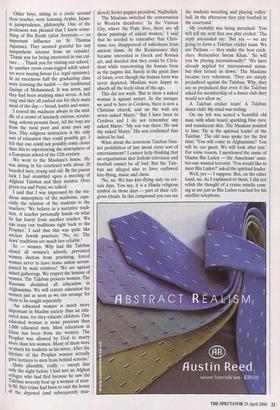THE FAR PAVILIONS
John Casey made some surprising
discoveries when he visited a Taleban training camp near Peshawar
'THIS is the area for sex,' said Arif, the young man who was showing me around Peshawar in the North-West Frontier Agency (as it is no longer called). 'Are you interested in sex? You would like to visit for sex?"No, thank you.' I suppose I was taken aback, because I spoke sharply. He was a very polite, civilised young man, a pious Muslim, whose sentences frequently began, 'As our Holy Prophet (peace be upon him) said. . . . ' He was also a mem- ber of Imran Khan's political party, which stands for uprightness of all sorts. So it was a bit disappointing.
He persisted: 'You would not like to see some sex?' Voyeurism! This time I tried to be diplomatic. 'Not tonight, thank you.' He seemed puzzled. It was a minute or two before it dawned on me that he was talking of Sikhs. He wanted to show me a venerable Sikh temple.
We went to the temple, where we sat on a carpet and discussed our different reli- gious traditions with the elders of the place. That it was a relaxed and very friendly dis- cussion is nothing to be surprised at — except that this was Pakistan, where reli- gious passions are supposed to run high. Thirty-five Sikhs had just been killed in Kashmir. The Indians blamed the killings on Islamic militants Pakistan blamed India (with some evidence). This was something about which the Sikhs we were talking to kept a careful silence.
But Peshawar is better known for its connection with the Taleban of Afghanistan than for its religious toler- ance. Not far from the town is a madrassa that has become famous as a training ground for the leaders of the Taleban. It is ruled by the Maulana Samiul Haq, a reli- gious and political figure who has been a member of the parliament of Pakistan. Eight Taleban cabinet ministers in Kabul have been educated under his aegis. I arranged to visit him and his madrassa.
Samiul Haq's son took me around. He said that his father was upset because (so he claimed) the journalist Robert Fisk, after a brief visit to the madrassa, had described it as 'a school of warriors'. He hoped I would not say anything like that. (Later, Maulana Samiul Haq swore solemnly that no military training went on there.) In fact what I saw was exactly what I had imagined. There were classrooms crammed with very small boys, sitting cross-legged, learning the Koran aloud by rote, bowing rhythmically as they chanted. None of them knew Arabic, so it was indeed the purest rote-learning. It was a babble of discordant voices because every one of them was reciting a different passage. Older boys, sitting in a circle around their teacher, were learning Arabic, Islam- 1c jurisprudence, philosophy. One of the professors was pleased that I knew some- thing of Ibn Rusht (alias Averrods — an important influence on St Thomas Aquinas). They seemed grateful for any Sympathetic interest from an outsider.
'Thank you for being interested in our cul- ture. . . Thank you for visiting our school.' In another room cross-legged adult schol- ars were issuing fatwas (i.e. legal opinions). In an enormous hall the graduating class were learning the hadith — the traditional Sayings of Mohammed. It was noon, and they had been studying since seven. A bell rang and they all rushed out for their main meal of the day — bread, lentils and water. I toured the madrassa always in the mid- dle of a crowd of intensely curious, scrutin- ising, solemn peasant faces. All the boys are from the rural poor and none pays any fees. This religious instruction is the only sort of education they could possibly get. I felt that one could not possibly come closer than this to experiencing the atmosphere of a European school of the 12th century. We went to the Maulana's house. He was sitting in his courtyard with about 20 bearded men, young and old. By the purest luck I had stumbled upon a meeting of Afghani Taleban and their mentor. Over green tea and Pepsi, we talked. . I said that I was impressed by the stu- dious atmosphere of the madrassa, espe- cially the relation of the students to the teachers: 'We believe in a narrative tradi- tion. A teacher personally hands on what he has learnt from another teacher. We can trace our traditions right back to the Prophet.' I said that this was quite like ancient Jewish practices. 'No, no. The Jews' traditions are much less reliable.'
So — women. Why had the Taleban closed all women's schools, prevented women doctors from practising, forced women never to leave home unless accom- panied by male relatives? 'We are against mixed gatherings. We respect the honour of women. The Taleban protects women. The Russians abolished all education m Afghanistan. We will restore education for women just as soon as we can arrange for them to be taught separately. An educated woman is much more important in Muslim society than an edu- cated man, for they educate children. One educated woman is more precious than 1,000 educated men. Most education in Islam has been from the women. The Prophet was allowed by God to marry more than ten women. Many of them were as much his students as his wives. After the lifetime of the Prophet women actually gave lectures to men from behind screens.' Quite plausible, really — except that °illy the night before I had met an Afghan refugee who had fled because he saw the Taleban severely beat up a woman of near- ly 80. Her crime had been to visit the house of the deposed (and subsequently mur- dered) Soviet puppet-president, Najibullah.
The Maulana switched the conversation to Western decadence: 'In the Vatican City, where the Pope lives, there are all these paintings of naked women.' I said that he needed to remember that Chris- tians, too, disapproved of nakedness from ancient times. At the Renaissance they became interested in Greek and Roman art, and decided that they could be Chris- tians while representing the human form as the pagans did. Surely in the great days of Islam, even though the human form was never depicted, Muslims were happy to absorb all the lively ideas of the age.
This did not wash: 'But to show a naked woman is against nature. In the mosque we used to have in Cordova, there is now a Christian church, and on the wall are seven naked Marys.' But I have been to Cordova and I do not remember any naked Marys."My son was there. He saw the naked Marys.' His son confirmed that indeed he had.
What about the notorious Taleban blan- ket prohibition of just about every sort of entertainment? I cannot help thinking that an organisation that forbids television and football cannot be all bad. But the Tale- ban are alleged also to have outlawed kite-flying, music and chess.
'No, no. We ban kite-flying only on cer- tain days. You see, it is a Hindu religious symbol on those days — part of their reli- gious rituals. In this compound you can see the students wrestling and playing volley- ball. In the afternoon they play football in the courtyard.'
My credulity was being stretched: 'You will tell me next that you play cricket.' The reply astounded me: 'But yes — we are going to form a Taleban cricket team. We are Pathans — they make the best crick- eters. Remember Imran Khan.' So will you be playing internationally?' We have already applied for international status, but they turned us down.' The Maulana became very vehement. 'They are simply prejudiced against the Taleban. Why, they are so prejudiced that even if the Taleban asked for membership of a dance club they would not allow us.'
A Taleban cricket team! A Taleban dance club! My mind was reeling.
On my left was seated a beautiful old man, with white beard, sparkling blue eyes, and translucent skin. The Maulana pointed to him: 'He is the spiritual leader of the Taleban.' The old man spoke for the first time: 'You will come to Afghanistan? You will be our guest. We will look after you.' For some reason, I mentioned the name of Osama Bin Laden — the Americans' num- ber-one wanted terrorist. 'You would like to meet Bin Laden?' asked the spiritual leader.
Well, yes — I suppose. But, on the other hand, no. As I explained to them, I did not relish the thought of a cruise missile com- ing at me just as Bin Laden reached for his satellite telephone.



























































 Previous page
Previous page